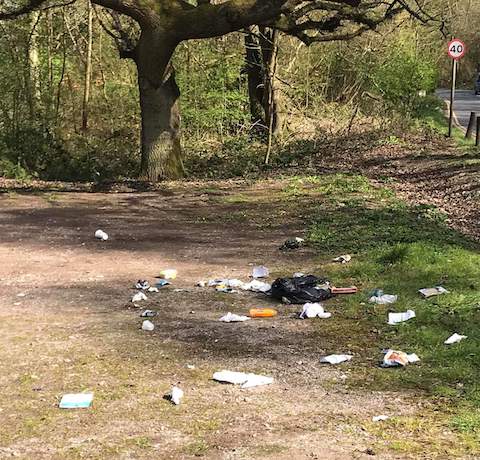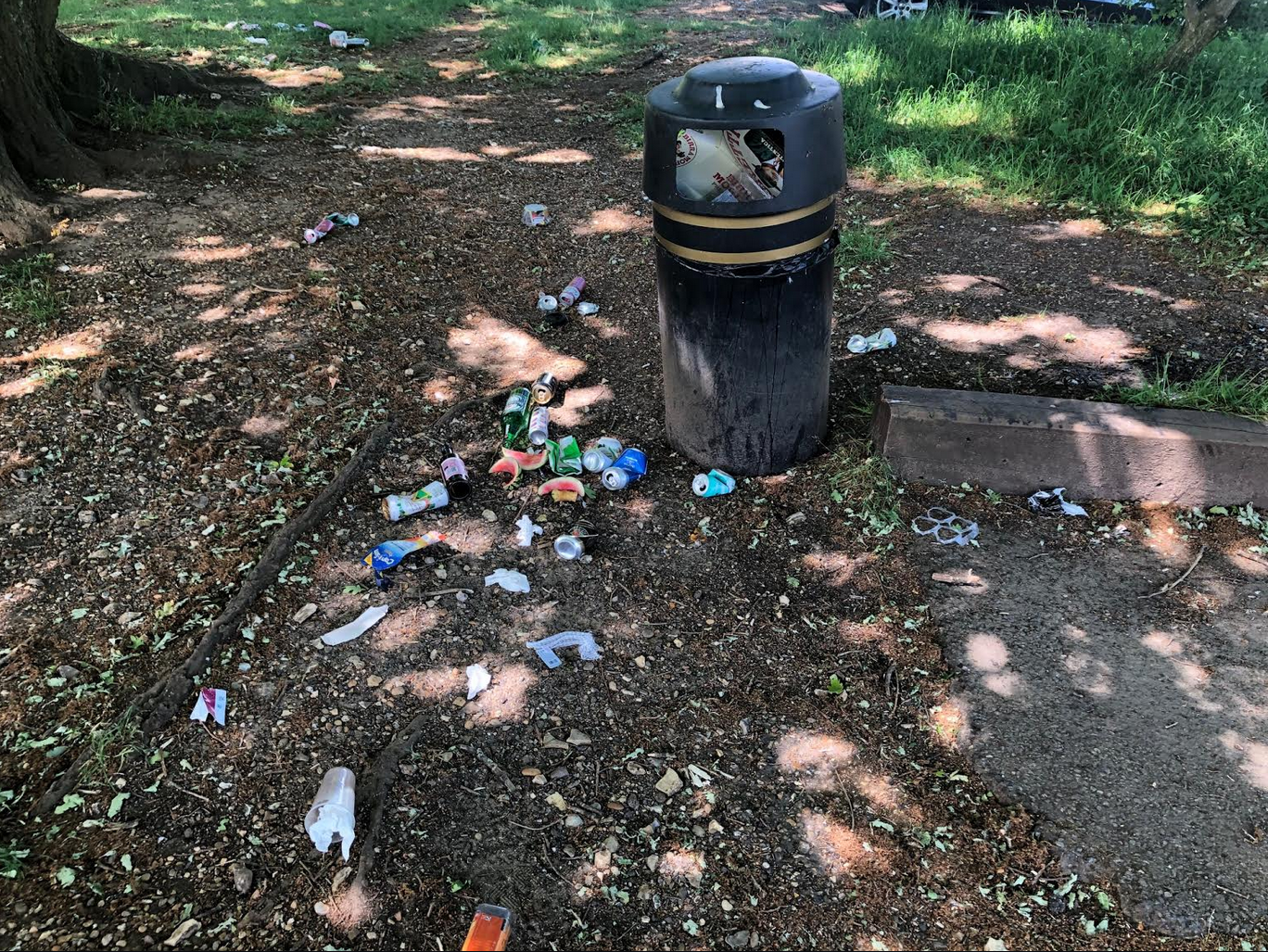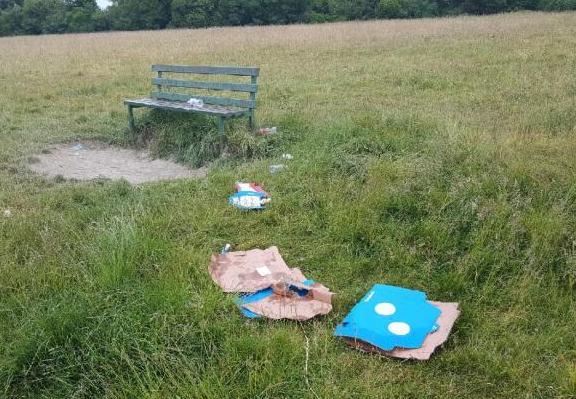 Abraham Lincoln
If given the truth, the people can be depended upon to meet any national crisis...
Abraham Lincoln
If given the truth, the people can be depended upon to meet any national crisis...
 Guildford news...
for Guildford people, brought to you by Guildford reporters - Guildford's own news service
Guildford news...
for Guildford people, brought to you by Guildford reporters - Guildford's own news service
Opinion: We’re Missing the Point About Our Litter Problem
Published on: 21 Jul, 2020
Updated on: 22 Jul, 2020
By David Roberts
Conducting a little anti-litter campaign in Britain’s most troubled overseas territories made me think hard about the subject, and my impression of the debate in Guildford, including the council’s “Don’t be a Tosser” campaign, is that we’ve got the wrong end of the stick.
There are some people who litter and a very large number who would never dream of doing so. The difference is cultural and educational, so deeply embedded that no poster campaign is going to turn a “tosser” into a “non-tosser’.
“Keep Britain Tidy” was an effective slogan when Britain was tidy. But the scale of our waste problem is now planet-threatening. From time to time we have an Attenborough moment, when it seems we have reached a tipping-point in public attitudes, for instance, to plastic rubbish. Then the moment passes and we move on.
So maybe it’s time to try something different and talk to the more-or-less responsible majority, rather than vilify the littering minority, many of whom (let’s face it) lead chaotic lives through no fault of their own. Put bluntly: you didn’t drop it but you can still pick it up.
Forget the tossers: my slogan would be “Your Street – Your Litter”. Older people may remember a time when people swept the street outside their properties. Not to do so would bring social shame. Fifty years of individualism and business-worship appear to have destroyed Britain’s civic pride.
As we drown in litter, we clutch at excuses. “It’s not mine. It’s the council’s job. It’s what I pay my taxes for. It’s people from elsewhere. It’s kids. It’s cyclists. It’s dog-walkers. It’s the cuts. I do my recycling already. I’m too busy. It’s disgusting. I can’t bend…”
Excuses, excuses. It’s easy to help keep your own immediate environment clean and some individuals already set an example by removing rubbish from their streets. You don’t have to wait to be told to do it. It doesn’t necessarily have to be a set-piece, feel-good event with matching T-shirts, which some public-spirited residents organise. Just do it. Now.
No-one likes living in a mess and most of us can put aside some time to “adopt” a section of street and keep it tidy. Gradually, this will turn the tide and make Guildford a cleaner, better place to live.
Councils can play a more determined role. The soft option of blaming delinquent “tossers” is a lazy substitute for having even a rudimentary anti-litter plan with measurable improvement targets, and I dread to think how much taxpayers have paid for GBC’s vulgar poster campaign. What exactly is the plan and why is no councillor appointed Litter Champion accountable for its success?
In my view, nothing much will happen until residents generally “own” the problem and the big majority with no particular sense of community feel they have a role. Most don’t want to be organised but still want clean streets. Public messaging should emphasise self-help and taking control and responsibility.
 Councils can help by saying how to get hold of litter-picking sticks and high-viz wear and by offering practical tips on rubbish disposal. They can persuade local fitness, walking or sports organisers that, with its gentle walking, stretching and lifting, litter-picking is better than Zumba.
Councils can help by saying how to get hold of litter-picking sticks and high-viz wear and by offering practical tips on rubbish disposal. They can persuade local fitness, walking or sports organisers that, with its gentle walking, stretching and lifting, litter-picking is better than Zumba.
They can make it easy by providing information on timing (fine, dry days in winter are best, when rubbish is most visible and accessible) and the obvious hazards from traffic and injury, which should not be overstated. Health and safety can be just another excuse for inertia.
Councils could also be clearer about what the law says, the penalties for littering, the obligation to keep ditches and water courses clear, and should crack down more effectively on landlords who don’t deal promptly with fly-tipping.
Finally, they should publicly praise those who make an effort. Heroes should never be unsung.
Is the idea of changing local attitudes towards litter too sentimental? Two things tell me it isn’t. One is social conformism. We have seen with plastic bag use, smoking and drink-driving that moral norms can be changed radically over time. There’s strong evidence to suggest that, if people know their neighbours are doing something, they are more likely to do it themselves, hence the motorway signs that nudge you to “Take Your Litter Home: Others Do”.
The other is Broken Windows Theory (Google it!). This suggests that small visible signs of anti-social behaviour lead to much more serious problems. Litter begets more litter and, eventually, fly-tipping and other crime.
That is because litter demoralises people and makes them feel apathetic about their surroundings. The challenge is to reverse this by showing the majority of residents the positive actions they can take.
Responses to Opinion: We’re Missing the Point About Our Litter Problem
Leave a Comment Cancel replyPlease see our comments policy. All comments are moderated and may take time to appear.

"Found any?" - "Nope, it all looks green to me!" (See Opinion: The Future is Congested, the Future is Grey)
www.abbotshospital.org/news/">





Recent Articles
- Latest Evidence in Sara Sharif Trial
- Ash’s New Road Bridge Is Named – and November 23rd Is Opening Day
- Class A in Underwear Leads to Jail Sentence
- Historical Almshouse Charity Celebrates Guildford in Bloom Victory
- Notice: Shalford Renewable Showcase – November 16
- Firework Fiesta: Guildford Lions Club Announces Extra Attractions
- Come and Meet the Flower Fairies at Watts Gallery
- Updated: Royal Mail Public Counter in Woodbridge Meadows to Close, Says Staff Member
- Letter: New Developments Should Benefit Local People
- Open Letter to Jeremy Hunt, MP: Ash’s Healthcare Concerns


Recent Comments
- Paul Spooner on Ash’s New Road Bridge Is Named – and November 23rd Is Opening Day
- Harry Eve on Opinion: The Future is Congested, the Future is Grey
- Nigel Keane on Letter: New Developments Should Benefit Local People
- Nathan Cassidy on Updated: Royal Mail Public Counter in Woodbridge Meadows to Close, Says Staff Member
- T Saunders on Opinion: The Future is Congested, the Future is Grey
- Jim Allen on Updated: Royal Mail Public Counter in Woodbridge Meadows to Close, Says Staff Member
Search in Site
Media Gallery
Dragon Interview: Local Artist Leaves Her Mark At One of England’s Most Historic Buildings
January 21, 2023 / No Comment / Read MoreDragon Interview: Lib Dem Planning Chair: ‘Current Policy Doesn’t Work for Local People’
January 19, 2023 / No Comment / Read MoreA3 Tunnel in Guildford ‘Necessary’ for New Homes, Says Guildford’s MP
January 10, 2023 / No Comment / Read More‘Madness’ for London Road Scheme to Go Ahead Against ‘Huge Opposition’, Says SCC Leader
January 6, 2023 / No Comment / Read MoreCouncillor’s Son Starts Campaign for More Consultation on North Street Plan
December 30, 2022 / No Comment / Read MoreCounty Council Climbs Down Over London Road Works – Further ‘Engagement’ Period Announced
December 14, 2022 / No Comment / Read MoreDragon Interview: GBC Reaction to the Government’s Expected Decision to Relax Housing Targets
December 7, 2022 / No Comment / Read MoreHow Can Our Town Centre Businesses Recover? Watch the Shop Front Debate
May 18, 2020 / No Comment / Read More










Jules Cranwell
July 21, 2020 at 6:50 pm
Common sense, as ever from Mr. Roberts.
Stuart Taylor
July 22, 2020 at 6:38 pm
Like it or loathe it I’m pretty sure that the litter-tosser campaign was designed to spark a debate. Job done, it seems. Interesting idea on the civic campaigns, I used to help out in a BTCV group elsewhere and I’m sure there are other groups looking for volunteers for similar local based activities.